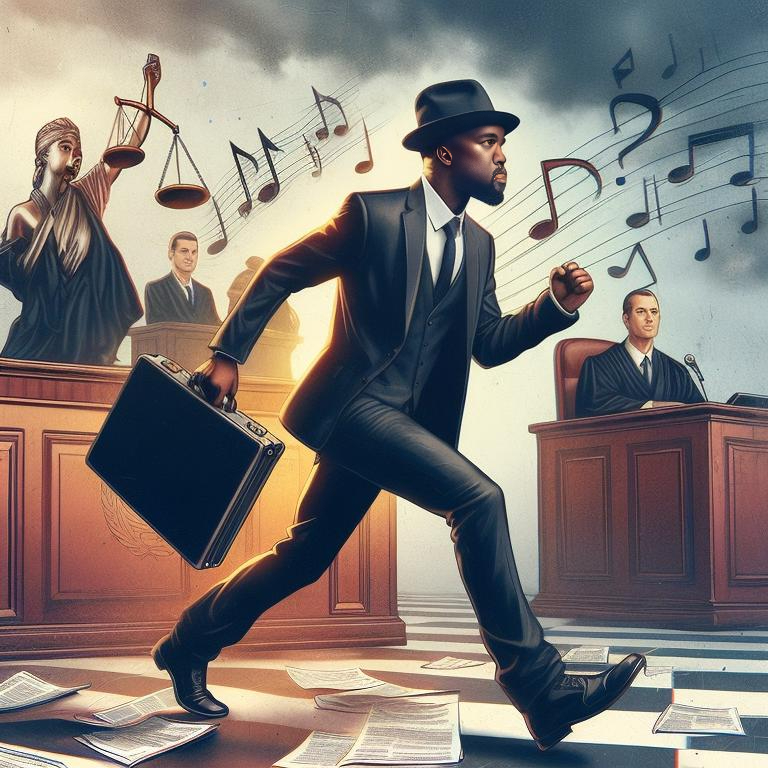
Copyright law contradicts the essence of creativity and using samples in the music industry. It had directly brought legal trouble to various famous musicians for decades. Basic copyright law was first established in 1790 but the first sample used in a song was a recorded African drumming track in John Kongo’s ‘He’s Gonna Step on You Again’ in 1971. To fully understand the effect of copyright law on the music industry, you must go back to the 90s. The 90s was a historic decade for Hip-Hop and even more historic for copyright law. Throughout the 80s and 90s, sampling became abundant in hip-hop and led to the first artist to have a legal battle in court over a sample used. The first court case of sampling was with Gilbert O’Sullivan versus Biz Markie in 91. Artists have paid out millions over the past few decades for using samples with many cases so large the amount is undisclosed. This was the beginning of a long list of artists battling courts with cases of copyright law as in the same year, 91, was one of the largest recorded payouts for a lawsuit in music. De la Soul was sued by the band The Turtles, and The Turtles settled for a 1.7-million-dollar payout. These two cases in 1991 single-handedly influenced a landslide of consequences and lawsuits to come. 1991 was a historic year for sampling as it changed everything-
“After 1991, artists changed how they sampled, largely out of fear of copyright infringement lawsuits. Hip-hop artists adapted and modified their musical language to accommodate the reduced availability of samples”
– Amanda Sewell
Copyright law in the music industry is systematically broken and abused. Lawsuits against artists have gone to ridiculous proportions of extreme as even after Hip-Hop changed, the musically creative minds of our time have still been persecuted for using samples. Frank Ocean was even sued for a sample within a sample. A record label owned a song that was sampled in Mary J Blige’s 1992 single ‘Real Love’, and Blige’s song was sampled by Frank Ocean. The company owned 3.15% of Blige’s song because of the sample and was suing for their part of Frank Ocean’s royalties.
“Even the best of artists, surrounded by teams of people working for them, become entangled in legal disputes with rights owners over any sample size”
– Jessica Meiselman
Moreover, is no clear definition or rules around the legal clearance of samples and therefore the biggest artists, supported by PR teams and multiple sound engineers, go to court over samples. In 2011, Cleveland DJ and rap artist Orrin Lynn Tolliver Jr. sued the Black Eyed Peas and a friend for over 1 million. They had licensed a sample of one of Tolliver’s recordings to the band for use in the song ‘My Humps’. Even when a sample is apparently cleared and licensed, artists are still not safe from copyright laws. Jay Z once paid $100,000 to an Egyptian artist to use a sample and because of different Egyptian legal concepts, he was still taken to court by the family of the sampled artist. Their claim was their moral rights were infringed upon. Moral rights are a concept not accepted in US law however Jay Z and Timbaland were still in a long legal battle because of it. This case won in favor of Jay Z and Timbaland; an outcome not experienced much by artists in legal sample court battles.
Artists whose creativity stems from using samples in their art find the world of copyright law increasingly frustrating. Kanye West is a world-renowned artist and producer who built a music empire with a heavy use of samples. Much of his work is referred to as genius or a masterpiece, yet he has faced countless legal disputes over said masterpieces. In 2005 alone, he was sued several times over multiple uncleared samples in his album Late Registration. He has been battling lawsuits over samples continuously since then. More recently in 2016, West was sued over an unauthorized sample from a Hungarian artist for 2.5 million. It was settled out of court in 2017 for an undisclosed amount. If an artist who is widely seen as a creative genius faces nonstop lawsuits throughout his career, there is no estimate of how many music creators have not been able to shine due to copyright laws. West has remained one of the largest artists in the world and built an empire, therefore it is implausible to assume he willingly uses uncleared samples in his work. An artist like West has people working on protecting his brand and fortune around the clock. This alone proves the system of copyright law is faulty, vague, and abused by many for financial gain.
References
Potter, Jordan. “What Was the First Song to Use Sampling?” Far Out Magazine, 7 July 2022, faroutmagazine.co.uk/the-first-song-to-use-sampling/.
Hannah. “Sampling: Its Role in Hip Hop and Its Legacy in Music Production Today.” Abbey Road Institute, 2 Feb. 2023, abbeyroadinstitute.co.uk/blog/sampling-role-in-hip-hop-and-its-legacy-in-music-production/#:~:text=There%20was%20a%20very%20famous,settled%20for%201.7%20million%20dollars.
Meiselman, Jessica. “Untangling the Knotty World of Hip-Hop Copyright.” Fact Magazine, 26 June 2016, www.factmag.com/2016/06/25/sampling-hip-hop-copyright/.
Sewell, Amanda. How Copyright Affected the Musical Style and Critical Reception of SampleBased HipHop, Wile Periodicals, Inc., hcommons.org/deposits/objects/hc:18434/datastreams/CONTENT/content. Accessed 25 Nov. 2023.
